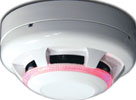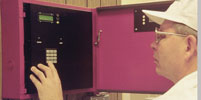

SANS 0400, which is a legal standard, states: "Any owner of any building who fails to maintain any provisions made to satisfy the requirements of sub regulation (T)1(1) (e) shall be guilty of an offence". (T) 1(1) (e) states "adequate means of access and equipment for detecting, fighting and extinguishing such fire is provided".
In short, by law the building owner has to maintain his fire systems or be liable for prosecution.
How often have we heard the statement, "We have a great fire system, it never gives any alarms"? On investigation we find the system is switched off.
There have been two recent cases of fire alarm systems sounding the alarm and the operator happily pushing the 'silence' button repeatedly without investigating the source of alarm. Result: large fires and huge financial losses for both the building owner and the insurer.
All of these things show the building owner pays little or no attention to the fire systems that are installed to protect lives and property.
Cut budgets and reduce maintenance seems to be a common South African problem and affects the fire industry as much as any other industry.
Apart from not complying with the law, building owners are guilty of not protecting their staff and customers while on their premises.
All South African codes of practice stipulate regular maintenance, the building owner consciously services his car every 15 000 kilometres but forgets about the equipment that is installed to save lives.
No prosecutions have been recorded for lack of maintenance of fire systems as yet, but times are changing.
The insurance industry suffered even greater fire losses in 2007; will they continue to pay out for fire damages whilst building owners continue to neglect their fire systems?
Fire systems generally remain passive until they are called upon to activate and due to this, they tend to be forgotten. This is all the more reason to check these systems.
Rubbers and seals in sprinkler valves collect dirt in the water supply, pipes deposit rust particles, fire detectors collect dust, batteries deteriorate over time, gas cylinders can leak; all things that need to be checked and tested on a regular basis.
Local standards dictate the following:
Fire Detection Systems SANS 10139 12.2.3 - Services should not exceed six months.
Gaseous Extinguishing systems SANS 14520 Annexure F - The electrical component shall be serviced every three months and mechanical components (pipe work etc) every six months.
CO2 Gas flooding systems SANS 306 9.1.1 - At least every six months the mechanical components of the system shall be thoroughly inspected and tested.
Automatic Sprinkler Systems SANS0287 10.2.3 - Quarterly, six-monthly and annual inspections and services are required.
These services have to be conducted by 'competent persons'; generally your local fire contractor but the buck does not stop there, the building owner carries the responsibility. The OSHA and fire standards deem 'the responsible person' the person who carries the can.

User requirements
The user has daily, weekly and monthly tests and routines to perform on all his fire protection systems. See table.

Logbooks
All fire standards specify that records must be kept of all checks, tests, maintenance and services.
The majority of fire systems sadly do not keep these records and therefore the building owners have no evidence of their systems performance and lay themselves at risk by having no system records.
Every system should be supplied with a logbook.
Logbooks are available from the Fire Systems Inspection Bureau.
Third-party inspections
Third-party inspection agencies for fire systems are in operation in South Africa; these provide peace of mind for the building owner that his system is installed correctly and in compliance to the relevant Code of Practice. Regular inspections take a lot of responsibility away from the builder owner.
Conclusion
South African Codes of Practice make maintenance a legal requirement; contractors provide 24-hour service teams; inspection bureaux provide inspections and certification. All the facilities are in place for good maintenance practices but neglected by the building owner.
For more information contact Fire Systems Inspection Bureau, [email protected]

© Technews Publishing (Pty) Ltd. | All Rights Reserved.